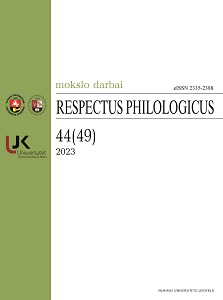Emancipation of the National Identity in Augusts Deglavs’ Novel “Riga”
Emancipation of the National Identity in Augusts Deglavs’ Novel “Riga”
Author(s): Inta Genese-PlaudeSubject(s): Sociolinguistics, Latvian Literature, Nationalism Studies, Identity of Collectives
Published by: Vilniaus Universiteto Leidykla
Keywords: national identity; Latvians; Baltic Germans; language; novel;
Summary/Abstract: The article studies the formation of the Latvian national identity as depicted in the cultural and historical novel Riga by the writer Augusts Deglavs. The plot is set in the second half of the 19th century when more and more Latvians from the country started to move to Riga. By applying the context-oriented approach and practices of cultural studies, the New historicism, post-colonialism, separate aspects of the dynamics and context of the relationship between Latvians and Baltic Germans in multicultural Riga have been analysed. In addition, the points where social and national identities contact and cross under the conditions of hermetic and hegemonic German culture, like relations with the German language, acquisition of social practices, emergence of the sense of Latvianness, have also been examined. The article also performs a concise evaluation of the historical importance of the Young Latvians’ movement depicted in the novel as the awakener of the national identity. Based on John Austin’s concept of performative language, in studying the emancipation of national identity, attention was paid to the ability of language “to do things”, which proves that words expressed in certain situations can possibly affect and change the run of historical processes.
Journal: Respectus Philologicus
- Issue Year: 2023
- Issue No: 44 (49)
- Page Range: 130-141
- Page Count: 12
- Language: English

